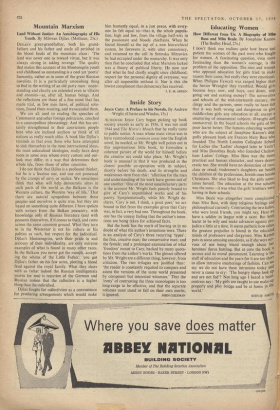Inside Story
ALTHOUGH Joyce Cary began picking up book society awards as early as 1936, it was not until 1944 and The Horse's Mouth that he really came to public notice. A man whose main virtue was to have reintroduced common sense into the English novel, he needed, as Mr. Wright well points out in this unpretentious little book, to formulate a coherent picture of the world for himself before the creative act could take place. Mr. Wright's book is unusual in that it was produced in the closest possible co-operation with its subject, shortly before his death, and its strengths and weaknesses stem from this : 'affection for the man and understanding of his work have grown out of one another.' One of the most unsatisfactory parts is the account Mr. Wright feels piously bound to give of Cary's unpublished works and of his poetry. Symptomatically, while Mr. Wright de- clares, 'Cary is not, I think, a great poet,' we are bound to feel from the examples given that Cary was, in fact, a very bad one. Throughout the book, one has the uneasy feeling that the author's inten- tions are being taken for achieved facts.
But the book has the merit of leaving us in no doubt of what the author's intentions were. There is an analysis of Cary's three recurring 'types': the free, creative man; the conservative man; and the female; and a prolonged examination of what 'freedom' meant to Cary, backed by many quota- tions from the author's works. The glosses offered by Mr. Wright are a different thing, however, from criticism. The two trilogies are justified thus : 'the reader is constantly required to compare and assess the versions of the same world presented by competent but interested witnesses.' That the 'irony' of contrasting the three monologues is too long-range to be effective, and that the separate volumes must stand or fall on their own merits,


































 Previous page
Previous page